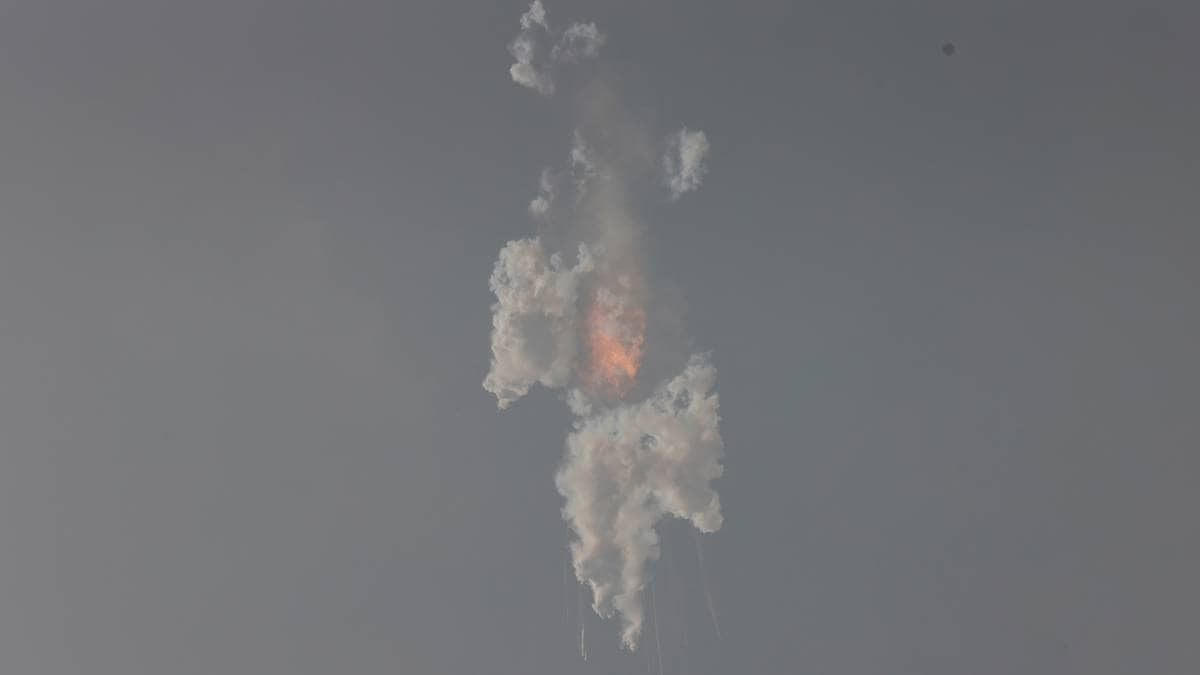The “Super Heavy/Starship” missile fails to launch. This was the first attempt to use the new type of missile. The rocket will land people on the moon, and SpaceX has plans to send it to Mars.
SpaceX said shortly after the explosion that the launch was partially successful. This is because the missile did not explode upon launch. The company has collected a lot of data that will let them know what went wrong.
The rocket successfully passed the part of the flight where it was subjected to the strongest aerodynamic forces.

Spinning: About a minute before it exploded, the Super Heavy/Starship rocket started spinning.
Photo: PATRICK T. FALLON/AFP
wrong from the start
The first sign of trouble was visible already 16 seconds after the start. Three of the engines in the first stage did not fire. This was revealed in the launch video. Later, two more engines failed. It is not clear if this was the cause of the failure of the flight.
The Super Heavy launch vehicle was scheduled to separate from the Starship 2 minutes and 40 seconds after launch.
Separation did not occur, and then the rocket began to rotate. It lasted for about a minute before an explosion occurred, destroying both parts of the missile mix.
It was the controlled detonation system that was activated.

The problems: 16 seconds after liftoff, SpaceX identified three of the first-stage engines as malfunctioning in the launch video.
Image: SpaceX
The craft was spinning, and SpaceX destroyed it. The missile was fitted with explosives that punched holes in the fuel tanks. This causes the rest of the fuel to explode.
Elon Musk reported on Twitter that they got a lot of good data. It is suggested that the next attempt may come in a few months. SpaceX has shown that it can quickly build rockets.

Congratulations: Elon Musk announced on Twitter that he is satisfied with the efforts of SpaceX employees.
Photo: Twitter/Misk
I thought it was going to be bad
Don’t expect success. Maybe things won’t go well. It’s very difficult, said Elon Musk, earlier this week.
The first attempt on Tuesday failed. Then it was the frozen valve that stopped the show. SpaceX reported that there was some moisture in the vent, and this hardened to ice when they began filling the rocket with supercooled fuel.
It took 48 hours to get everything ready for another try.

BIGGER THAN ANYTHING: At 120 metres, the superheavy spacecraft/spacecraft is bigger than the rockets that brought people to the Moon.
Photo: SPAX/Reuters
The largest in the world
The missile rises 120 meters above the ground. At the time of launch, it will be filled with 4,600 tons of liquid methane and oxygen. An explosion can destroy a launch turret if it occurs immediately after the engines have ignited.
The engines in the first stage produce a whopping 74 meganewtons of thrust. That is, up to 300 Boeing 737 NG regular passenger aircraft.
He was going to end up at sea anyway
Both the Super Heavy and Starship are designed to be reusable. During the test, it will continue to be destroyed. The two are launched as one unit. In just two minutes, the “Starship” will be separated from the “Super Heavy”.
SpaceX wanted to show off a lot during the first flight. Among others are the following:
- That the launch vehicle can take the ship into space.
- The launch vehicle is capable of soft landing on the ground.
- The ship can survive return from space.
“Super Heavy” was supposed to simulate a descent. It was supposed to take place in the sea directly east of the launch site. The rocket must decelerate and reach zero vertical velocity directly at the surface. There it will capsize and drown.
The “spacecraft” will use its own engines to reach roughly the speed it needs to reach orbit. Over the Pacific Ocean, it will re-enter the atmosphere. If you survive this, you will float towards the surface of the sea.
The encounter would have been so brutal that “Starship” been vandalized. SpaceX expected the vehicle to explode. The “spacecraft” should not attempt to simulate a landing.

“Organizer. Social media geek. General communicator. Bacon scholar. Proud pop culture trailblazer.”

